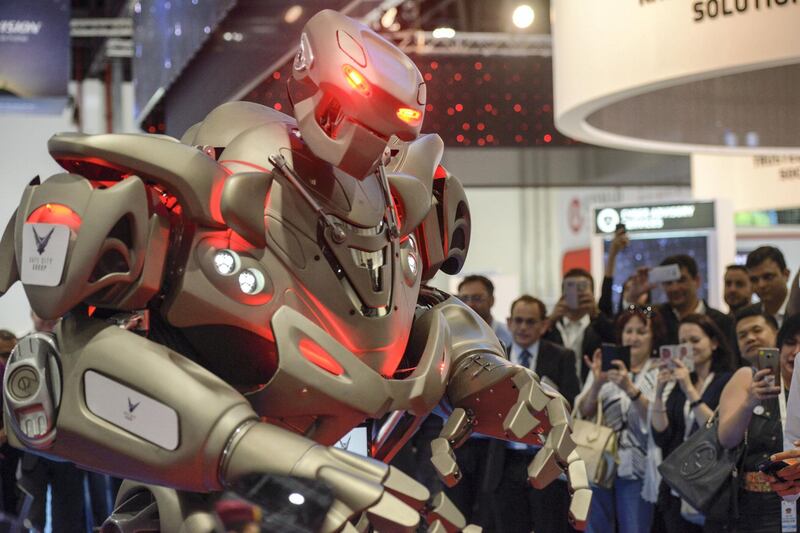Applications of artificial intelligence in domestic security will revolutionise the future of policing worldwide by reducing the time needed to capture criminals from hundreds of thousands of hours to just one.
Experts speaking at the Future of Policing Forum, part of the International Exhibition for National Security and Resilience in the capital on Wednesday, said integrating AI technology into national security would mean new and more efficient ways for police do their jobs.
“AI advancement creates a new generation of security capabilities, making our society safer,” said Peng Xiao, chief executive of Pegasus, an Abu Dhabi-based Darkmatter company focused on data science and AI.
"In China, the government is leading the way in AI innovation – the Chinese government is spending more money on domestic security than its military."
With around 50 billion devices expected to be connected to the 8 billion people on the planet, AI will increase communication and connectivity.
“In 2012, it took police forces in China hundreds of thousands of hours of CCTV to get 15 seconds of a serial killer’s image before capturing him,” Mr Xiao said.
"AI evolved quite rapidly since 2012 because data and computing became available. Five years later, AI continued to mature and a camera system was able to track the movement of a kidnapper in real-time, finding him in one hour using facial recognition, and within 18 hours, the kidnapped boy was brought back."
With the Fourth Industrial Revolution under way, security authorities in the UAE are exploring how to best implement AI to move from an active role to a pre-emptive one.
“AI is capable of changing our ideas and vision thanks to a new system that will govern humanity,” said Col Suleiman Al Kaabi, director of innovation and foresight at Abu Dhabi Police.
“When borders no longer exist between what is normal and artificial, real and superficial, and human and artificial, AI will put in place mechanisms that can learn, think and take decisions,” he said.
_______________
Read more:
UAE to phase out immigration officers in favour of AI by 2020
WATCH: Walking through Dubai airport's virtual aquarium security tunnel
______________
“The future could be governed by autonomous cars and taxis and new senses linked to the internet. As for aviation, planes, drones and small satellites will hover freely all over us – the future is open to all possibilities and what hasn’t been achieved lately will perhaps be achieved in the next decade,” said Col Al Kaabi.
The UAE has embraced these technologies and, just last month, officials from the Ministry of Interior said they intended to phase out immigration officers in the UAE by 2020 in favour of AI.
“Creativity, AI and this revolution inside the UAE will lead us to embrace any new ideas,” said Maj Gen Dr Ahmed Al Raisi, general inspector at the Ministry of Interior.
“The Emirati model isn’t just in tolerance but in foreseeing the future too and developing the country – no idea is trivial,” he said.
Mr Xiao said adoption of these technologies means we could be living in “not just a digital smart city, but a cognitive city that can think on its own and solve crime without us, leading to the Fifth Industrial Revolution.”
But AI has challenges and it cannot be relied on 100 per cent to solve crimes, experts said.
“Humans can work with it because AI can be biased and needs a lot of computing power,” said Mr Xiao.
“We don’t have [that technology] today so we need to work together to improve that. We believe the future of our society will be much greater and better through strong partnership between the public and private sectors and AI will bring about a new chapter of human revolution.”






